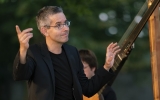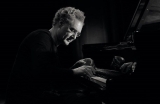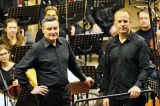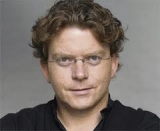Frau Ruckgaber, als Sie darüber nachgedacht haben, Ihr Debütalbum aufzunehmen, hatten Sie da gleich diese ungewöhnliche Idee im Kopf, die sich nun auf ‘Love and Let Die’ als eine Art ‘gesungene Kriminalgeschichte in Liedern’ präsentiert?
Die Idee entstand abends auf dem Wohnzimmersofa. Gerade schaute ich eine Krimiserie, und da ich den Tag damit zugebracht hatte, für einen Veranstalter neue Liederabendprogramme zu entwerfen, vermischte sich beides, Krimi und Lied, und so fragte ich mich halb im Scherz: Kann man nicht auch mal ein Programm entwickeln, das anders ist? Read More →
Herr Reize, Monteverdi gilt als einer der frühesten Opernkomponisten, nicht wenige sehen in ihm wenn schon nicht den eigentlichen Erfinder, so doch den ersten Vollender dieses Genres. Dabei ist es interessant zu sehen, wie der Komponist eine Art musikalisches Doppelleben führte, bei dem er als Kapellmeister des Markusdoms geistliche Werke aufführte und komponierte, parallel dazu aber weltliche Vokalstile wie die Oper vorantrieb. Hat ihm die geistliche Musik nicht genügend Möglichkeiten gegeben, sich kompositorisch auszuleben oder hat Monteverdi sich durch die säkulare Musik vor allem eine zweite Einnahmequelle sichern wollen?
Da muss ich sagen, das stimmt so nicht. Damals war ja die Kirchenmusik gar nicht getrennt von der weltlichen Musik. In Mantua zum Beispiel war Monteverdi für alles zuständig – Schütz ja auch, in Dresden. Nur sind in Bezug auf Schütz die weltlichen Sachen nicht überliefert. Aber das weltliche und geistliche Musizieren wurde damals von den Ausübenden nicht getrennt. Read More →
Ivan Boumans, Deconstructing Love ist ein Auftragswerk des Kulturministeriums. Was können Sie zu diesem neuen Werk sagen?
Es ist die Umsetzung eines Projektes, das ich eigentlich schon jahrelang mit mir herumtrage. Nämlich das universelle Thema der Liebe zu analysieren. Deconstructing ist also nicht als zerstören zu deuten, sondern eher als mikroskopische Analyse von ‘Was ist Liebe?’ Read More →
Corinna Niemeyer, alleine über Frauen auf dem Dirigentenpult zu reden, mutet schon einem Klischee an. Wie wichtig ist es eigentlich wirklich, über dieses Thema zu sprechen.
Ich denke, es ist nicht so wichtig speziell über Dirigentinnen zu reden, aber es ist grundsätzlich wichtig, über Frauen in Führungspositionen zu reden. Gibt es Aufstiegsbarrieren und wenn ja wo? Es gibt in vielen Bereichen nach wie vor sehr wenige Frauen in Führungspositionen. Im Vergleich zu den allermeisten Frauen in Führungsrollen ist die Dirigentin sichtbarer, man sieht sie auf der Bühne. Read More →
Herr Meister, nach fast drei Jahren Corona laufen die Bayreuther Festspiele wie auch die meisten kulturellen Institutionen wieder einigermaßen rund. Und doch hat diese Zeit vieles im Bewusstsein der Menschen verändert. Auch auf kultureller Ebene.
Ja, denn wir erleben gerade eine Zeit, die wichtige Weichenstellungen vor sich hat. Zweierlei habe ich in der letzten Zeit erfahren, das mich bedrückt hat. Bei manchen Eltern, in Schulen und Kindergärten hat sich der Eindruck verfestigt, dass Singen grundsätzlich gefährlich sei. Durch Singen mache man andere krank. Diese Botschaft, die in ihrer Absolutheit natürlich nicht nur blödsinnig ist, sondern auch gefährlich, ist bei vielen leider hängengeblieben. Read More →
Ihr Festival Gezeitenkonzerte in Niedersachsen beginnt im Juni und endet im November. 6 Monate Festival, fast 50 Konzerte, da kann man schon nicht mehr von einem kleinen Festival sprechen. Welche Idee steckt dahinter?
Die Gezeitenkonzerte finden in der Regel von Anfang Juni bis Anfang August statt – also etwa 8 Wochen großartige Musik mit zahlreichen Weltstars, Nachwuchskünstlern, Orchestern wie Kammerensembles auf der ostfriesischen Halbinsel. Mit etwa 35-40 Veranstaltungen dürften die Gezeitenkonzerte mittlerweile das größte Flächenfestival im Bundesland Niedersachsen sein. Dies ist das Kernfestival. Read More →
Im Jahr 2022 jährt sich der Geburtstag von César Franck zum zweihundertsten Mal. Für viele Menschen gilt Franck entweder als ein Orgelmusikkomponist oder als der Komponist der berühmten Symphonie in d-Moll. Was denken Sie, wie wir ihn stattdessen sehen sollten?
Fabio Banegas: Am meisten bin ich von seiner asketischen Persönlichkeit angetan. Er war ein äußerst bescheidener, disziplinierter und hingebungsvoller Mann, der sich für seine Kunst, seine Familie, seine Schüler und seine Religion einsetzte. Allein an einem Werk wie dem kolossalen Oratorium Les Béatitudes können wir schon den Umfang seines Werks und seines Intellekts ermessen. Read More →
Bramwell, what does it mean to conduct an orchestra? I ask this question because the other day, a conductor of great reputation made the remark to me, about a colleague that he had not conducted, but had merely beaten the beat…
Beating the beat is a purely technical gesture that has no other function than to allow the musicians to play together physically. But it is the expressiveness of the gestures, the nuances of the gestures, thus the way of gesticulating that create the true communication and prepare the ground to release the inner spirit of the music. Read More →
Wie ein Wirbelwind war er aus dem fernen Kanada ins Luxemburger Musikleben eingeflogen: Bramwell Toveys erste Woche als Chefdirigent des Luxemburger Philharmonischen Orchesters erinnerte an Rossinis ‘Barbiere’: ‘Tovey qua, Tovey là’. Zwischen Programmkonferenzen, Strategieplanung, Arbeitsessen mit Verwaltungsräten und Gewerkschaftlern wurde eifrig geprobt: zwei Konzerte mit Beethovens Egmont-Ouvertüre, dessen Violinkonzert mit der wundervollen Sarah Chang und der Lemminkainen-Suite von Jean Sibelius waren zu erarbeiten, nebst einem Kammermusikprogramm für die ‘Amis de l’OPL’, bei dem Tovey als Pianist auftrat. Read More →
Herr Bosch, was ist denn das Besondere an den Opernfestspielen Heidenheim?
Ich denke, es gibt nur wenige Festivals auf diesem Niveau, die ausschließlich selber produzieren und, wie in diesem Jahr, vier Eigenproduktionen auf die Bühne bringen, darunter Wagners Tannhäuser und Verdis I due Foscari. Die großen romantischen Opern werden mit den Stuttgarter Philharmonikern unter freiem Himmel im Schloss Hellenstein aufgeführt, die kleineren Opern mit der Cappella Aquileia im Festspielhaus. Read More →



























